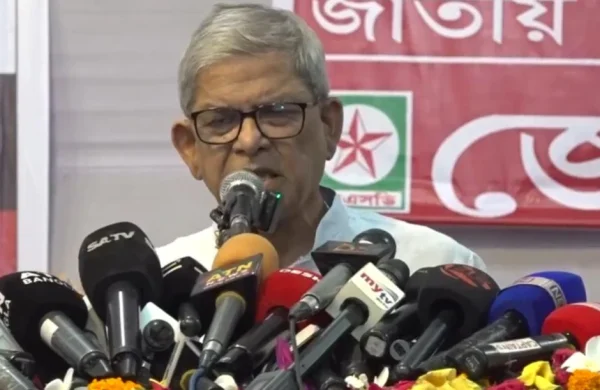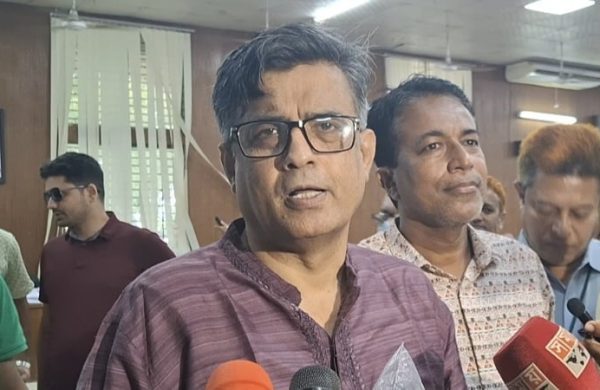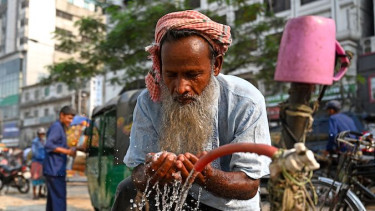Pharmaceutical industry: Protests disrupt drug production, crisis feared
- Update Time : Friday, September 6, 2024

TDS Desk:
Unrest prevails in the pharmaceutical industry, with labour demands continuing unabated. As a result of these protests, production remained closed in 25 large drug factories. Businesspersons feel a crisis of medicines may emerge in the market if the problems are not resolved any time soon. Till now, however, drug supply remains normal.
In the meantime, after discussions with the workers, several pharmaceutical factories, including Square Pharmaceuticals, Incepta Pharmaceuticals and others are scheduled to resume production today, Friday. However, there is still uncertainty over when Healthcare Pharmaceuticals and a few other factories will reopen.
Speaking to this correspondent, president of Bangladesh Association of Pharmaceutical Industries (BAPI) Abdul Muktadir said, the overall pharmaceutical sector has not returned to normal as yet. There is still a sense of fear among certain entrepreneurs and workers. Once the overall law and order situation improves, the pharmaceutical industry’s problems will be resolved too.
According to the pharmaceutical industries association, there are around 300 drug production companies in the country. Around 200 of these are operational. These factories meet around 98 per cent of the country’s demand for medicines. A number of the companies export medicines to over 150 countries around the world.
“We expect more cooperation from the government in the incidents like the employees being held hostage in some factories. It should be ensured that no such hostage situation arises again,” said Abdul Muktadir, president, Bangladesh Pharmaceutical Industries Association.
LABOUR DEMANDS
The workers of Popular Pharmaceuticals in Tongi, Gazipur, blocked the Dhaka-Mymensingh highway on 25 August, demanding fixed wages, an increase in attendance bonus, and more. The demonstrations later spread to General Pharmaceuticals, Square Pharmaceuticals, Incepta Pharmaceuticals, Healthcare Pharmaceuticals, Ibne Sinha and other pharmaceutical factories. When the situation spiralled out of control, production in 25 factories shut down.
Varying from factory to factory, the workers voiced up to 21 demands. The demands included as Tk 15,000 to Tk 25,000 minimum wage, a 20 to 25 per cent annual wage increase, promotions every two years, two-day weekend, seven-day Eid holiday and three-day Durga Puja holiday, scope to form labour union through elections, permission to use mobile phone on the production floor, etc.
The top officials of several pharmaceutical companies said, after the workers were assured that some of their justified demands would be met, they are coming up with new demands. There are certain demands which, if met, would break the chain of command within the factories. The industry owners are extremely anxious at the moment. The officials feel that there is a certain group instigating the workers’ unrest from behind the scenes.
The Square Pharmaceutical authorities on Saturday announced one of their factories closed for one week in Kaliakoir, following the workers’ demands and demonstrations. After long discussions with the workers yesterday, Thursday, the officials decided to resume production.
Square Pharma’s executive director (finance and Strategy) Md Jahangir Alam said, at the meeting the workers had assured the authorities that they would return to work. And so now production would resume today, Friday, he said.
On Monday night, Healthcare Pharmaceuticals workers in Rajendrapur of Gazipur, laid siege to around 400 officials. When the management assured them that their demands would be met, the workers finally released the officials after 33 hours.
Officials of the factory said, while they had managed to calm and convince the workers, none of the officials turned up at the factory yesterday, Thursday, out of fear. It is still uncertain when production will resume. The more complex part of the situation is that along with the demands for minimum wages, annual increment and increased provident funds as well as profit bonus, the workers also submitted a list of officials’ names, demanding them to be removed.
Chief executive officer (CEO) of Healthcare Pharmaceuticals, Muhammad Halimuzzaman, told this correspondent that for many years there has been no problems in the Bangladesh medicine market. But if the factories shut down because of these demands being made by the workers, things will be difficult. The country will face a problem. He said, “The chain of command has broken down in the factories. There is a sort of unruliness in the factories. We do not want any unjustified support. We do not want anything forced upon us. Finding out alternative, we have turned to the government for help.”
Speaking about the workers laying siege to the officials, president of the pharmaceutical industry association Abdul Muktadir said, “We expect more cooperation from the government in the incidents like the employees being held hostage in some factories. It should be ensured that no such hostage situation arises again. If there are specific directives from the government in this regard, confidence will grow among the employees in this sector.”
CRISIS IN SUPPLY FEARED
There were 166 pharmaceutical companies in the country towards the start of the eighties. Of these, 8 were foreign companies, but they controlled 70 per cent of the market. At present, local companies meet 98 per cent of the country’s medicine requirements. The remaining 2 per cent of the medicines is imported.
Pharmaceutical industrialists say that over the past one decade the local market has expanded almost three times. The market in 2012 was of Tk 90 billion (Tk 9000 crore). Today it stands at Tk 300 billion (Tk 30,000 crore). The global market for generic drugs is around USD 400 billion (USD 40,000 crore).
Though many pharmaceutical factories remain closed, a drug crisis has not emerged in the market as yet.
Zareen Karim, Managing director (MD) of Orion Pharma in Siddhirganj, Narayanganj, told this correspondent that normally one month’s drugs are kept in stock, but production has been impeded in many factories over the past two weeks. Unless the situation improves speedily, a crisis of drugs may emerge in the market. There are certain drugs have to be kept 3 to 14 days after production to first check whether there is any microbiological reaction before being released in the market.
In reply to another question, Zareen Karim said, if the situation does not improve soon, there may be a crisis of injectable drugs.
Production is carrying on at Orion Pharma’s factory, but the workers are demanding an increase in minimum wages from Tk 11,000 to Tk 15,500 and to make the part time workers permanent. The management has asked for one month to implement the demands and the workers have acquiesced.
Director of Bangladesh Chemists and Druggists Association, Anwar Hossain Mridha, told this correspondent, “There is no problem in drug supply as yet because the companies keep 7 to 17 days’ stock in their depots. But we are worried with the closure of large pharmaceuticals. If the present standstill continues, there soon will be a crisis of drugs. In such situations, many wholesalers hoard drugs and the prices spiral. The drug companies have no control over such situations.
EXPORTS AFFECTED
Bangladesh presently exports medicines to around 150 countries. Nine pharmaceutical manufacturing companies of the country have, in the meanwhile, received approval from the relevant authorities of the US, European Union and Australia as well as the World Health Organisation.
According to the Export Promotion Bureau (EPB), drugs of USD 175 million (USD 17 crore 50 lakh) was exported in the 2022-23 fiscal. And in the first ten months (July-April) of the 2023-24 fiscal, the export of medicines from Bangladesh totalled USD 169.2 million (USD 16 crore 92 lakh). This export is 17 per cent higher that than in the corresponding period of the previous year.
“The workers need to control their emotions and remain within a legal framework. If we harm the industry, we will lose our jobs. The workers should give the owners and the government time for change,” said Kalpana Akhter, executive director, Bangladesh Centre for Workers Solidarity.
Secretary general of the pharmaceutical industries association SM Shafiuzzaman, speaking to this correspondent, said production has been disrupted in 25 factories including Square, Renata and Healthcare, for a week. If the situation does not improve, there is feat that a crisis of certain drugs will emerge next week. Exports are being affected too.
RESOLVING THE CRISIS
Labour advisor of the interim government Asif Mahmud Sajib Bhuiyan last Wednesday spoke of taking measures to resolve the unrest in the industrial area. He said that those who are instigating the unrest, will be arrested. Even after the stern message from the government, many factories in Ashulia, Savar, yesterday were forced to declare a holiday yesterday, Thursday, due to the labour agitation.
A number of entrepreneurs in the pharmaceutical sector feel that if the disruption in production continues for long, this will create a crisis in the supply of essential drugs. These drugs include live-saving drugs, paediatric drugs, drugs for diabetes, high blood pressure, cancer and other drugs for long-term medical treatment, as well as medicines for livestock.
If a crisis emerges in drug supply, medical treatment will be under threat. Drugs cannot be easily imported as other commodities. This entails many scientific tests and examinations. So if production remains shut for long in the prevailing circumstances, the supply of life-saving drugs will be disrupted. A serious crisis may loom large.
Executive director of the Bangladesh Centre for Workers Solidarity (BCWS) Kalpana Akhter, speaking to this correspondent, said if the government declares that the existing labour laws must be followed by all factories, then most of the labour demands will be met. The remaining demands can be sorted through discussions with the workers. As for the demands for certain officials to be dismissed, that is not acceptable. If the authorities form an inquiry committee regarding the officials, the workers will be reassured. The department for inspection of factories will have to be given the responsibility to oversee these matters.
Kalpana Akhter went on to say, “We are going through a time of transformation. We all hope for positive change. The workers need to control their emotions and remain within a legal framework. If we harm the industry, we will lose our jobs. The workers should give the owners and the government time for change.”















